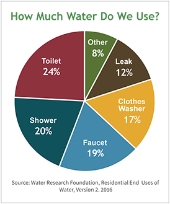Eric Hanson wrote:Andy,
I suppose that if alkalinity were a problem you could add just a little vinegar and check the ph again. Is alkaline water going to be a problem? Rainwater is naturally slightly acidic, so if the problem is caused by baking soda, the problem may resolve itself over time.
Please, let me know your thoughts,
Eric
Hi Eric,
To be honest we're so new to this that I'm just trying to be very careful. I've read that drinking water should have a pH of no higher than 8. It's entirely possible that undissolved baking soda could be the issue and the more it gets diluted the lower the pH will get. It's also possible that the pH of the rain is high. I'll know more on that tomorrow when I catch some fresh rain and test it. I'm not even sure that running high pH water through the pump and sediment filter won't damage the equipment itself. Now I've seen the online fads about drinking alkaline water but even those only have a pH of 8 or 9, so we're currently way past that.
One thing I've learned is that for the first 49 1/2 years of my life I took running water and drinkable water very much for granted. Now that we're in a spot that is too small for a well and we're having to collect rainwater I'm really starting to appreciate the whole turn-on-the-tap-and-out-comes-the-water thing that "normal" people enjoy.







